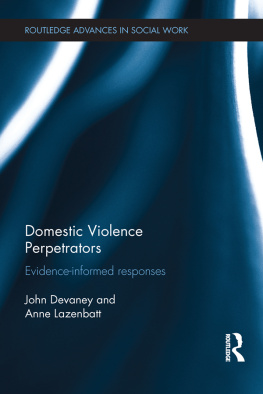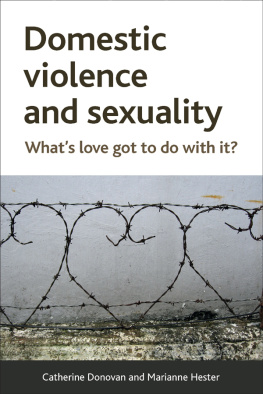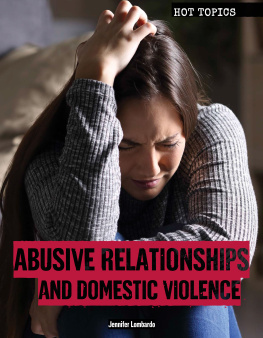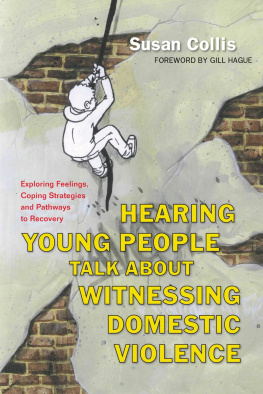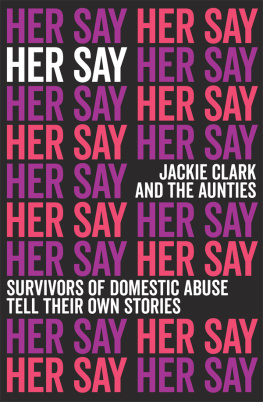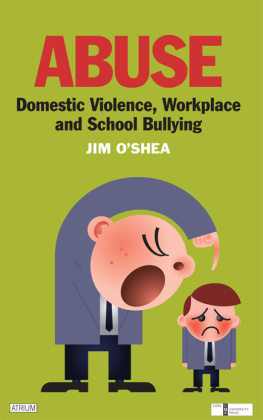by the same editors
Talking About Domestic Abuse
A Photo Activity Workbook to Develop Communication Between Mothers and Young People
Cathy Humphreys, Ravi K Thiara, Agnes Skamballis and Audrey Mullender
ISBN 978 1 84310 423 0
Talking To My Mum
A Picture Workbook for Workers, Mothers and Children Affected by Domestic Abuse
Cathy Humphreys, Ravi K Thiara, Agnes Skamballis and Audrey Mullender
ISBN 978 1 84310 422 3
Disabled Women and Domestic Violence
Responding to the Experiences of Survivors
Ravi K Thiara, Gill Hague, Ruth Bashall, Brenda Ellis and Audrey MullenderForeword by Nicola Harwin
ISBN 978 1 84905 008 1
of related interest
Rebuilding Lives after Domestic Violence
Understanding Long-Term Outcomes
Hilary Abrahams
ISBN 978 1 84310 961 7
Supporting Women after Domestic Violence
Loss, Trauma and Recovery
Hilary Abrahams
Foreword by Cathy Humphreys
ISBN 978 1 84310 431 5
Picking up the Pieces After Domestic Violence
A Practical Resource for Supporting Parenting Skills
Kate Iwi and Chris Newman
ISBN 978 1 84905 021 0
Safeguarding Children from Abroad
Refugee, Asylum Seeking and Trafficked Children in the UK
Edited by Emma Kelly and Farhat Bokhari
ISBN 978 1 84905 157 6
Meeting the Needs of Ethnic Minority Children including Refugee, Black and Mixed Parentage Children
A Handbook for Professionals
2nd edition
Edited by Kedar N. Dwivedi
ISBN 978 1 85302 959 2
Violence Against Women
in South Asian
Communities
Issues for Policy and Practice
Edited by Ravi K. Thiara and Aisha K. Gill
Foreword by Professor Liz Kelly
Jessica Kingsley Publishers
London and Philadelphia
First published in 2010
by Jessica Kingsley Publishers
73 Collier Street
London N1 9BE, UK
and
400 Market Street, Suite 400
Philadelphia, PA 19106, USA
www.jkp.com
Copyright Jessica Kingsley Publishers 2010
Foreword copyright Liz Kelly 2010
All rights reserved. No part of this publication may be reproduced in any material form (including photocopying or storing it in any medium by electronic means and whether or not transiently or incidentally to some other use of this publication) without the written permission of the copyright owner except in accordance with the provisions of the Copyright, Designs and Patents Act 1988 or under the terms of a licence issued by the Copyright Licensing Agency Ltd, Saffron House, 610 Kirby Street, London EC1N 8TS. Applications for the copyright owners written permission to reproduce any part of this publication should be addressed to the publisher.
Warning: The doing of an unauthorised act in relation to a copyright work may result in both a civil claim for damages and criminal prosecution.
Library of Congress Cataloging in Publication Data
Violence against women in South Asian communities : issues for policy and practice / edited by Ravi K. Thiara and Aisha K. Gill; foreword by Liz Kelly.
p. cm.
Includes bibliographical references and index.
ISBN 978-1-84310-670-8 (pb : alk. paper) 1. Women--Violence against--South Asia. 2. Women--Violence against--South Asia--Prevention. 3. Women--Government policy--South Asia.
I. Thiara, Ravi K. II. Gill, Aisha K.
HV6250.4.W65V567635 2009
362.82'920954--dc22
2009014502
British Library Cataloguing in Publication Data
A CIP catalogue record for this book is available from the British Library
ISBN 978 1 84310 670 8
eISBN 978 0 85700 203 7
To Amarjeet, always in my heart,
for all the laughter and friendship
(R.K Thiara)
In memory of my mother, Surinder Kaur,
a victim of gender-based violence.
(A.K. Gill)
Acknowledgements
Listening to women and children since the late 1980s has been invaluable; to them I owe a huge debt of gratitude. A big thank you to those giants of the violence against women movement whom I have learnt so much from. And all those courageous women who continue to transgress boundaries and remain an inspiration.
Deep gratitude to my nearest and dearest, you know who you are, and especially to my parents, Shiv Singh and Satwant Kaur, and to Maanuv, Jyot, and Bhavan, our future.
Ravi K. Thiara
I begin by acknowledging the contributions of the women in this book, and the committed efforts of South Asian womens groups who work on the frontline. The poignancy of these cases inspires me to continue to invest my professional energy in this often challenging and always humbling work.
Special thanks are offered to Sonia Bhola, Mary Venning, Roger Fokerd, Tabassum Sayani, Saira Shafi, Bilal Sayed, Tabitha Freeman, Rowena Macaulay, Suki Dhanda, Paminder Parbha, Saika Alam, Shazia Nizam, Meera Betab, Vidya Maharaj and Daljit Kang, for their belief in this project, which was inspirational, and to Vik Chaudhuri, whose patience and understanding was so valuable especially during the final days of submission of this manuscript. Also, thanks to Edward Graham, Jeremy Lowe, Peter Bloom and Pathik Pathak, who were all willing to read some of my earlier drafts and respond promptly with insightful comments.
Most of all, I would like to thank my uncle, Santokh Singh, whose commitment to this whole process cannot be calculated. Thank you for constantly reminding me of my history, and for teaching me that nothing is beyond my reach. It is in memory of your sister, my mother, that I do this kind of work.
Aisha K. Gill
Foreword
As someone who has worked in the field of violence against women (VAW) for over thirty years, alongside a number of the contributors to this book, it is a profound honour to be asked to write this foreword. This is an historic collection that documents, recognises and renews the contributions to the UK movement against VAW by South Asian feminists; contributions made as researchers, as activists, as practitioners. Indeed, for three decades South Asian feminists in Britain have combined these categories in creative and inspirational ways, living the multiple identities which contemporary social theory is now engaging with. They have been activist scholars, activist practitioners and practitioner-researchers; seeking out and creating spaces in between (Morris 2008). Neither margin nor centre, these are spaces in which challenge and change are the order of the day; where the separating boundaries and binaries between disciplines and forms of practice are resisted. Working in between as an academic involves having one foot outside the public we are part of, enabling critical reflection on how divisiveness and fragmentation in civil society is structured and reproduced. The reflexivity demands here are considerable reflection about self in movement (and I could write an entirely different introduction about my self in movement within an ever evolving understanding of racism).
Intersectionality has been at the core of the work of Asian feminists for decades; now recognised conceptually in academia through being named. As this becomes a dominant approach in critical social theory more deservedly than many of its predecessors there is a tendency inside and outside the academy (including in womens studies), to neglect to remember that Kimberley Crenshaw (as she was then) coined the term within a reflection about black American womens experiences of VAW and challenges to majority feminist organisations. This is but one of the many, frequently unmarked, contributions on VAW to critical scholarship and movements for social justice. Indeed, it is in the practices of VAW activists that some of the promise of feminist coalition has been most evident at national and international levels; not least the global coalition which worked to get womens rights mainstreamed into international human rights thinking (Kelly 2004). Too much of this vital and innovative theory in action work is yet to be documented, since all too often


